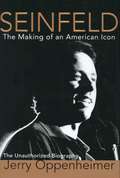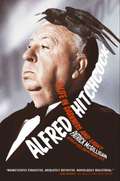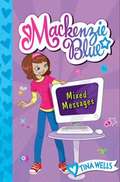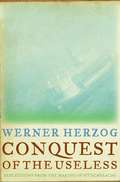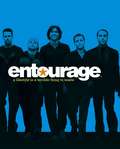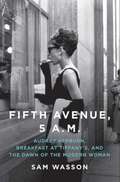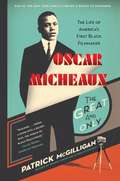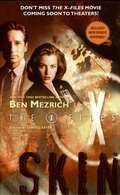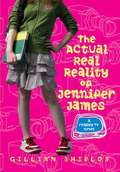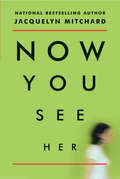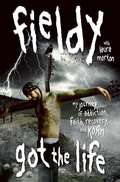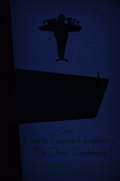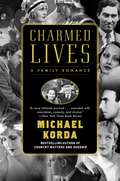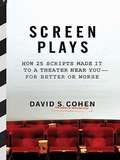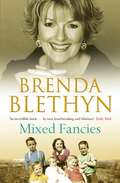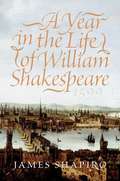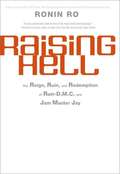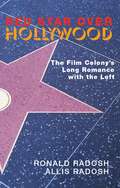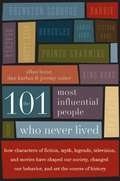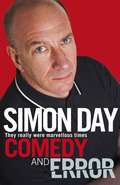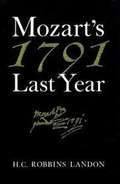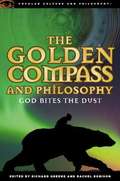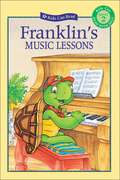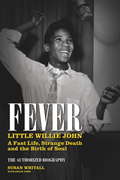- Table View
- List View
Seinfeld: The Making of an American Icon
by Jerry OppenheimerThe never-before-told story of how Jerry Seinfeld made his dream come true -- of how this very ambitious, extremely driven, compulsively perfectionistic carefully worked his way up through the knock-down-drag-out world of stand-up comedy as it began to explode in the mid-1970s, & how he went on to co-create in the late 80s what is considered to be the most successful TV sitcom in its history. From the start, Jerry has been extremely private about all aspects of his personal life. For more than a year, Oppenheimer conducted in-depth interviews with scores of Jerry s closes friends, family members, bus. assoc., lovers, & fellow comedians who spoke candidly, painting a riveting portrait of the beloved & talented comedian.
Alfred Hitchcock: A Life in Darkness and Light
by Patrick McgilliganIn a career that spanned six decades and more than sixty films, Alfred Hitchcock became the most widely recognized director who ever lived. His films -- including The 39 Steps, Notorious, Rear Window, Vertigo, Psycho, and The Birds -- set new standards for cinematic invention and storytelling Élan. Since his death, Hitchcock has become crystallized in the public imagination as the macabre Englishman, the sexual obsessive, the Master of Suspense. But this remarkable biography draws on prodigious new research to restore Hitchcock the man -- the ingenious craftsman, the avid collaborator, the constant trickster, provocateur, and romantic. Like Hitchcock's best films, Patrick McGilligan's life of Hitchcock is a drama full of revelation, graced by a central love story, dark humor, and cliff-hanging suspense: a definitive portrait of the most creative, and least understood, figure in film history.
Mackenzie Blue: Mixed Messages
by Tina WellsMackenzie Blue and her crew are plugged in! Zee and her band, The Beans, are getting ready for their biggest show yet! Everyone's talking about it online at Bluetopia-the coolest social-networking site ever. Top three reasons that Bluetopia is the best: I can keep all my thoughts safe in a private blog, and I won't have to worry about anyone stealing my diary (finally)! The Beans have a huge show coming up, and we can make sure everyone knows about it! Jasper (my best guy friend) is in the spotlight for creating the site. He's so talented-he deserves it.
Conquest of the Useless: Reflections from the Making of Fitzcarraldo
by Werner HerzogOne of the most revered filmmakers of our time, Werner Herzog wrote this diary during the making of Fitzcarraldo, the lavish 1982 film that tells the story of a would-be rubber baron who pulls a steamship over a hill in order to access a rich rubber territory. Later, Herzog spoke of his difficulties when making the film, including casting problems, reshoots, language barriers, epic clashes with the star, and the logistics of moving a 320-ton steamship over a hill without the use of special effects. Hailed by critics around the globe, the film went on to win Herzog the 1982 Outstanding Director Prize at Cannes. Conquest of the Useless, Werner Herzog's diary on his fever dream in the Amazon jungle, is an extraordinary glimpse into the mind of a genius during the making of one of his greatest achievements.
Entourage: A Lifestyle Is a Terrible Thing to Waste
by Tim SwansonGet the inside scoop on the HBO hit comedy, Entourage, and learn what really happens when you make it big in Hollywood. If you don't know whether the following statements are true or false you need this book. 1) Vince spends $2,500 per month for Drama's vitamin supplements. (See page 76) 2) Ari Gold addressed this advice to Eric: "Be a man, or as much as a man as you can possibly be, for God f---ing sakes." (See page 103) 3) It is very easy to find a "ridiculously hot girl" in Los Angeles. (See page 129) Filled with exclusive interviews, fashion profiles of the main characters, listings of the real-life L.A. hotspots where the show has been filmed, and more than one hundred hilarious and previously unpublished images from Entourage's first four seasons. This book is an all-access guide to the glamorous world of Vince, E, Drama, Turtle, and Ari.
Fifth Avenue, 5 A.M.
by Sam WassonAudrey Hepburn is an icon like no other, yet the image many of us have of Audrey-dainty, immaculate-is anything but true to life. Here, for the first time, Sam Wasson presents the woman behind the little black dress that rocked the nation in 1961. The first complete account of the making of Breakfast at Tiffany's, Fifth Avenue, 5 A.M. reveals little-known facts about the cinema classic: Truman Capote desperately wanted Marilyn Monroe for the leading role; director Blake Edwards filmed multiple endings; Hepburn herself felt very conflicted about balancing the roles of mother and movie star. With a colorful cast of characters including Truman Capote, Edith Head, Givenchy, "Moon River" composer Henry Mancini, and, of course, Hepburn herself, Wasson immerses us in the America of the late fifties before Woodstock and birth control, when a not-so-virginal girl by the name of Holly Golightly raised eyebrows across the country, changing fashion, film, and sex for good. Indeed, cultural touchstones like Sex and the City owe a debt of gratitude to Breakfast at Tiffany's. In this meticulously researched gem of a book, Wasson delivers us from the penthouses of the Upper East Side to the pools of Beverly Hills, presenting Breakfast at Tiffany's as we have never seen it before-through the eyes of those who made it. Written with delicious prose and considerable wit, Fifth Avenue, 5 A.M. shines new light on a beloved film and its incomparable star.
The Sound of Music (The Beloved Story of the Trapp Family)
by Howard Lindsay Russel CrouseMaria, the wonderful, lively heroine of The Sound of Music, is a postulant at an Austrian abbey when the play begins. Happy, young, and well-liked, she is nevertheless in difficulty at the abbey. It seems that Maria can't control her desire to sing. The young postulant is sent to the home of Captain von Trapp, a widower, to act as governess for his seven children.
Oscar Micheaux: The Great and Only
by Patrick McgilliganOscar Micheaux was the Jackie Robinson of film, the black D. W. Griffith: a bigger-than-life American folk hero whose important life story is nearly forgotten today. Now, in a feat of historical investigation and vivid storytelling, one of our greatest film biographers takes on one of the most talented and complex figures in the history of American entertainment. The son of freed slaves, Micheaux grew up in Metropolis, Illinois, then roamed America as a Pullman porter before making his first mark as a homesteader in South Dakota. Disaster and defeat there led him to forge a career publishing a successful series of autobiographical novels. Ever the entrepreneur, when Hollywood failed to bid high enough for film rights to his stories, he answered by forming his own film production company. Going on to produce or direct twenty-two silent and fifteen sound films in his lifetime, Micheaux became the king of the "race cinema" industry at a time when black-produced films had to scrounge for venues in a segregated society. In this groundbreaking new biography, award-winning film historian Patrick McGilligan offers a vivid and fascinating portrait of this little-known pioneer. Part visionary, part raffish Barnum-like showman, Micheaux was both a maverick filmmaker and an inveterate hustler who used every weapon at his disposal to break the color barrier and thrive in a profession he helped to invent. He made a fortune and lost it again, and launched repeated con games that were followed by public arrests and bankruptcies. He eagerly took credit for the work of others-including his unsung-heroine wife. In his desperate later years, he even sunk to plagiarizing his final novel-a discovery McGilligan reveals here for the first time. In this searching exploration, McGilligan tracks down long-lost financial records, unpublished letters, and unmarked pauper's graves, pinpointing Micheaux's birthplace, his tangled personal life, and the circumstances of his tragic death. The result is an epic that bridges a fascinating period in American history, and offers lessons for anyone who would understand the role of black America in forming the culture of our time.
The X-Files: Skin
by Ben MezrichWhen moonlighting medical students "harvesting" skin from a corpse for temporary use accidentally take it from the wrong donor, the results are catastrophic: a New York City hospital ward is destroyed in a bloodbath, and an elderly professor, admitted for a routine skin graft, is suddenly the city's most wanted fugitive.Agents Fox Mulder and Dana Scully are the only ones to suspect something more ominous than a medical procedure gone awry. As the FBI agents investigating the "X-Files"--strange and inexplicable cases the Bureau wants to keep hidden--Mulder and Scully are determined to track down the forces they suspect are behind the murderer.While the police hunt the fleeing professor, Mulder and Scully track the skin that was grafted onto him, a trail that leads from the morgue to the headquarters of a cutting-edge biotech company to the jungles of Thailand. Together they begin to uncover an unholy and totally deniable alliance between a battle-trained plastic surgeon, international politicians, and a legendary Thai monster known as the "Skin-Eater."
The Actual Real Reality of Jennifer James
by Gillian ShieldsThis is the diary of Jennifer James. It contains: One Heroine: Jennifer James, burdened by brains, struggling to release her Inner Babe One High School: London Road Comprehensive, a no-hope English school in a no-hope English town One Prize: A scholarship to the elite St. Willibald's College [Jennifer's idea of Paradise] offered to the winner of a tacky reality TV show, Down The Bog and . . . A Thousand Complications: Like Jocasta, the crazy feminist mother; Tallulah, the blond rival from hell; Marcus, the guy with green eyes; and above all, the actual real reality that Jennifer's chances of winning are less than Mega-Zero. . . .
Now You See Her
by Jacquelyn MitchardFor Hope Shay the entire world is a stage. Really. Acting has been her dream for as long as she can remember. She will do anything, anything, to get a leading role. Okay, maybe faking her own abduction was extreme. But a true actress suffers for her art. And Hope is a born actress if ever there was one.
Got the Life: My Journey of Addiction, Faith, Recovery, and Korn
by FieldyWhat have you got when you Got the Life? From Korn's legendary bassist comes a no-holds-barred look at the extreme highs and drug-and-booze-fueled lows of the biggest heavy metal band of our era Music was in his bones. From the time he was an infant, Fieldy watched his dad's band perform, and soon enough he found his own calling: the bass. After high school, with a guitar and little else, he left his small California town for the music scene in L.A. Before long, Fieldy, Brian "Head" Welch, James "Munky" Shaffer, drummer David Silveria, and Jonathan Davis would gel together and form a band with a completely new sound-Korn. What happened next was something Fieldy had always dreamed of but was totally unprepared for: Korn exploded, skyrocketing to the top of the charts and fronting the nu metal phenomenon. Fieldy was thrust into the fast-paced, hard-rocking spotlight. Korn began to tour incessantly, creating intense live shows fueled by wild offstage antics. Fieldy became a rock star, and he acted like one, notorious not only for his one-of-a-kind bass lines, but also for his hard-partying, womanizing, bad-boy ways. The more drugs he took, the more booze he drank, the worse he became: He was unfaithful, abusive, mean, and sometimes violent. By all appearances, Fieldy had the life. But he was on the dark path of excess, alienating friends, families, and loved ones, nearly destroying himself and the band. It took an unexpected tragedy to straighten him out: the death of his father, a born-again Christian, to a mysterious illness. Following his father's dying wish, Fieldy found God. Filled with the spirit of his new faith, Fieldy quit drugs and drinking cold turkey, and found the best part of himself. With never-before-seen photos, and never-before-heard stories, Got the Life is raw, candid, and inspiring-the ultimate story of rock and redemption.
Guests
by Russell LynesOur eminent founding father Ben Franklin once famously compared guests to stinking fish. While this assessment may seem a trifle harsh, the truth remains that social intercourse is a most risky endeavor. Who better to address this concern than the inimitable pundit Russell Lynes--a man renowned for his unparalleled expertise on the social graces and the many personality types who regularly abuse them? In this classic guide to "guesting," Lynes provides an indispensable overview of the rituals of behavior that make it possible to visit and be visited, and the necessary safeguards that protect us from our friends and our friends from us. It is a book that demands to be read by every potential guest and host, stinker and stinkee alike.
Charmed Lives: A Family Romance
by Michael KordaA Rolls Royce Silver Cloud drove him to airports; the British film industry kowtowed to his power; the great Hollywood studios fawned at his feet. Sir Alexander Korda, one of the world's most flamboyant movie tycoons, rose from obscurity in rural Hungary to become a legendary filmmaker. With him were his brothers, Zoltan and Vincent, all living charmed lives in circles that included H. G. Wells, Sir Lawrence Olivier, Marlena Dietrich, Vivien Leigh, and Merle Oberon, who was soon to be Alex's wife. But along with Alex's flair for success was an equally powerful impulse for destruction. Now, Vincent's son, Michael Korda, in the first book of his memoirs, recalls the enchanted figures of his childhood...the glory days of the Korda brothers' great films...and then their heartbreaking, tragic end.
Screen Plays: How 25 Scripts Made It to a Theater Near You--for Better or Worse
by David S. CohenIn this fascinating survey of contemporary screen craft, David Cohen of Script and Variety magazines leads readers down the long and harrowing road every screenplay takes from idea to script to screen. In interviews with Hollywood screenwriters from across the board-Oscar winners and novices alike-Cohen explores what sets apart the blockbuster successes from the downright disasters. Tracing the fortunes of twenty-five films, including Troy, Erin Brockovich, Lost in Translation, and The Aviator, Cohen offers insider access to back lots and boardrooms, to studio heads, directors, and to the over-caffeinated screenwriters themselves. As the story of each film evolves from the drawing board to the big screen, Cohen proves that how a script is written, sold, developed, and filmed can be just as dramatic and intriguing as the movie itself-especially when the resulting movie is a fiasco. Covering films of all kinds-from tongue-in-cheek romps like John Waters's A Dirty Shame to Oscar winners like Monster's Ball and The Hours-Screen Plays is an anecdote-filled, often inspiring, always revealing look at the alchemy of the movie business. With Cohen as your expert guide, Screen Plays exposes how and why certain films (such as Gladiator) become "tent poles," those runaway successes every studio needs to survive, and others become train wrecks. Full of critical clues on how to sell a script-and avoid seeing it destroyed before the director calls Action!-it's the one book every aspiring screenwriter will find irresistible.
Mixed Fancies
by Brenda BlethynBorn in Ramsgate during the 1940s, Brenda Bottle was the youngest of nine in a poor but close family. She left school to work as a secretary for British Rail, where she met her husband. But by the age of twenty-seven, the marriage was over. Brenda left her job and with the little she had saved, enrolled at Guildford Drama School. And so her life as an actress began. One of Britain's best-loved actresses, Brenda Blethyn has dazzled in a vast number of roles, including her performances as downtrodden Cynthia in Mike Leigh's SECRETS AND LIES and as the man-eating Mari Hoff in LITTLE VOICE, for which she received Oscar nominations. On stage, television and film she has worked with our greatest writers and directors -- Alan Bennett, Tom Stoppard, Sam Mendes, Peter Hall -- and actors -- including Michael Caine, Jude Law, Julie Walters, Brad Pitt, Ewan McGregor and John Hurt. Brenda is one of Britain's finest character actresses, famous for playing her roles with social realism and warmth, wit and humour -- characters her audience empathise with. She has the same warmth and humour off screen too; a wonderfully down-to-earth person with a fascinating history. Told with sparkling wit and engaging honesty, MIXED FANCIES is the compelling story of her journey from the Plains of Waterloo to the National Theatre and on to television, Hollywood and stardom.
A Year in the Life of William Shakespeare, 1599
by James Shapiro1599 was an epochal year for Shakespeare and England. Shakespeare wrote four of his most famous plays: Henry the Fifth, Julius Caesar, As You Like It, and, most remarkably, Hamlet; Elizabethans sent off an army to crush an Irish rebellion, weathered an Armada threat from Spain, gambled on a fledgling East India Company, and waited to see who would succeed their aging and childless queen. James Shapiro illuminates both Shakespeare's staggering achievement and what Elizabethans experienced in the course of 1599, bringing together the news and the intrigue of the times with a wonderful evocation of how Shakespeare worked as an actor, businessman, and playwright. The result is an exceptionally immediate and gripping account of an inspiring moment in history.
Raising Hell: The Reign, Ruin, and Redemption of Run-D. M. C. and Jam Master Jay
by Ronin RoThe year is 1978. Saturday Night Fever is breaking box office records. All over America kids are racing home to watch Dance Fever, Michael Jackson is poised to become the next major pop star, and in Hollis, Queens, fourteen-year-old Darryl McDaniels--who will one day go by the name D.M.C.--busts his first rhyme: "Apple to the peach, cherry to the plum. Don't stop rocking till you all get some." Darryl's friend Joseph Simmons--now known as Reverend Run--thinks Darryl's rhyme is pretty good, and he becomes inspired. Soon the two join forces with a DJ--Jason "Jam Master Jay" Mizell--and form Run-D.M.C. Managed by Run's brother, Russell Simmons, the trio, donning leather suits, Adidas sneakers, and gold chains, become the defiant creators of the world's most celebrated and enduring hip-hop albums-and in the process, drag rap music from urban streets into the corporate boardroom, profoundly changing everything about popular culture and American race relations. Through candid, original interviews and exclusive details about the group's extraordinary rise to the top--and its mortal end brought on by the tragic murder in 2002 of Jam Master Jay--Raising Hell tells of Run-D.M.C.'s epic story, including the rivalries with jealous peers, their mentoring of such legendary artists as the Beastie Boys and Public Enemy, and the battles with producers, record executives, and one another. Ronin Ro delivers a meticulously researched, compellingly written, affecting behind-the-music tale of family, friendship, betrayal, murder, and the building of the culture and industry known as hip-hop.
Red Star Over Hollywood: The Film Colony's Long Romance with the Left
by Ronald Radosh Allis RadoshUntil now, Hollywood's political history has been dominated by a steady stream of films and memoirs decrying the "nightmare" of the Red Scare and how it victimized political innocents. But in Red Star over Hollywood, Ronald and Allis Radosh tell for the first time the "backstory" behind this myth. The authors show how the Soviet Comintern decided to make the film capital a prime target in the late 1920s. They follow the lives of Budd Schulberg, Ring Lardner Jr., Maurice Rapf and other young radicals who journeyed to the USSR in the early 1930s, underwent a political conversion experience there, and came back to Hollywood as apostles preaching a Soviet gospel. They take us inside the cells and discussion groups that Communist Party members formed, the guilds and unions they tried to take over, and the studios they aimed to influence. The Radoshes not only prove that the members of the Hollywood Party were loyal first and foremost to Joseph Stalin, but demonstrate that in fact many of the screenwriters who later became part of the Hollywood Ten succeeded in using film as a propaganda medium in behalf of the Soviet cause. One of their most significant accomplishments was the wartime blockbuster Mission to Moscow, whose inside story the authors document in fascinating detail. The Radoshes are at their best when writing about the blacklist era. They take us inside the strategy sessions of the Hollywood Communists as they prepared to testify in front of the House Committee on Un-American Activities, revealing that while others were lionizing them as blameless victims of American nativism and paranoia, the Hollywood Reds themselves were beset by doubts and disagreements about their disloyalty to America and their treatment by the Communist Party. Creating memorable portraits of Dalton Trumbo, Elia Kazan and John Garfield, the authors also trace the afterlives of those touched by HUAC and the blacklist, and document their continuing argument with America and each other through the next half-century. Red Star over Hollywood is an epic work about one of the most discussed but least understood episodes in our political life. Getting behind the denial and apologetics, the Radoshes tell a story whose long half-life has not ended. The men and women who agitated for Communism decades ago created a living legacy used by Jane Fonda and others who revived the Hollywood Left in the 1960s, and by figures such as Susan Sarandon, Tim Robbins and Sean Penn in the equally turbulent filmland politics of today. Ronald Radosh, adjunct Senior Fellow at the Hudson Institute, was the first writer to establish the guilt of Julius Rosenberg, in his bestselling book, The Rosenberg File. He is also the author of Commies: A Journey Through The Old Left, The New Left, and the Leftover Left. Allis Radosh is the author of Persia Campbell: Portrait of a Consumer Activist.
The 101 Most Influential People Who Never Lived
by Allan Lazar Jeremy Salter Dan KarlanFrom Santa Claus to Buffy the Vampire Slayer, from Uncle Sam to Uncle Tom, here is a compelling, eye-opening, and endlessly entertaining compendium of fictional trendsetters and world-shakers who have helped shape our culture and our lives. The 101 Most Influential People Who Never Lived offers fascinating histories of our most beloved, hated, feared, and revered invented icons and the indelible marks they made on civilization, including: # 28: Rosie the Riveter, the buff, blue-collar factory worker who helped jump-start the Women's Liberation movement # 7: Siegfried, the legendary warrior-hero of Teutonic nationalism responsible for propelling Germany into two world wars # 80: Icarus, the headstrong high-flyer who inspired the Wright brothers and humankind's dreams of defying gravity . . . while demonstrating the pressing need for flight insurance # 58: Saint Valentine, the hapless, de-canonized loser who lost his heart and head at about the same time # 43: Barbie, the bodacious plastic babe who became a role model for millions of little girls, setting an impossible standard for beauty and style
Comedy and Error: They Really Were Marvellous Times
by Simon DayBest known as one of the stars of the Fast Show (where he played characters such as Dave Angel -- Eco-Warrior, Tommy Cockles and Competitive Dad) and Bellamy's People co-starring Paul Whitehouse, Simon Day tells the shocking, sometimes sad and hilariously funny story of his life so far. Simon Day's memoir is a story of unlikely successes and secret lives. In the early 1980s he was a petty thief living rough in South East London and stealing whatever he could to fund an addiction to fruit machines. He was arrested and sentenced to borstal. Simon's memoir tells the story of how this nice, middle-class boy from the suburbs -- a self-confessed 'crap criminal' -- served time with the professionals and hard-cases in a jail fiercely divided along racial lines during the height of the 1981 riots. It moves on to the lucky breaks, the talent getting recognised, the 'redemption' of his years as a celebrity . . . with the parallel story of his addiction which -- with money and success -- became fuelled by drugs. Dark and dramatic, Simon Day's memoir is a laugh-out-loud-funny story of drugs, crime and comedy.
1791: Mozart's Last Year
by H. C. LandonBiography of Mozart's last year, in which he wrote The Magic Flute, La Clemenza di Tito, and the Clarinet Concerto, as well as most of the Requiem.
The Golden Compass and Philosophy: God Bites the Dust
by Richard Greene Rachel RobisonPhillip Pullman's controversial fantasy trilogy His Dark Materials comes under the scrutiny of Atlantic anglophone scholars of philosophy and religion, and literature and libraries. They reflect on such topics as whether Pullman is corrupting the young, faith and circumcision, the truth in Lyra's lies, kicking up some dust, cutting like a knife, whether the Magisterium could be right, worlds of possibility, and why the dead choose death. The style is informal, irreverent even, as part of the effort to make philosophy accessible to young people and lay readers.
Franklin's Music Lessons
by Paulette BourgeoisFranklin wants to play "Row, Row, Row Your Boat" on the piano, so he begins taking lessons. He learns the scales, but he would rather play baseball than practice. Will Franklin ever master the song? This Level 2 first reader contains longer stories, varied sentences, increased vocabulary, more difficult visual clues and some repetition.
Fever: Little Willie John's Fast Life, Mysterious Death, and the Birth of Soul
by Susan WhitallLittle Willie John lived for a fleeting 30 years, but his dynamic and daring sound left an indelible mark on the history of music. His deep blues, rollicking rock 'n' roll and swinging ballads inspired a generation of musicians, forming the basis for what we now know as soul music. Born in Arkansas in 1937, William Edward John found his voice in the church halls, rec centers and nightclubs of Detroit, a fertile proving ground that produced the likes of Levi Stubbs and the Four Tops, Stevie Wonder, Aretha Franklin, Diana Ross and the Supremes, Smokey Robinson and Hank Ballard and the Midnighters. One voice rose above the rest in those formative years of the 1950s, and Little Willie John went on to have 15 hit singles in the American rhythm & blues chart, with considerable cross-over success in pop. Some of his songs might be best known by their cover versions ("Fever" by Peggy Lee, "Need Your Love So Bad" by Fleetwood Mac and "Leave My Kitten Alone" by The Beatles) but Little Willie John's original recording of these and other songs are widely considered to be definitive, and it is this sound that is credited with ushering in a new age in American music as the 1950s turned into the 60s and rock 'n' roll took its place in popular culture. The soaring heights of Little Willie John's career are matched only by the tragic events of his death, cutting short a life so full of promise. Charged with a violent crime in the late 1960s, an abbreviated trial saw Willie convicted and incarcerated in Walla Walla Washington, where he died under mysterious circumstances in 1968. In this, the first official biography of one of the most important figures in rhythm & blues history, author Susan Whitall, with the help of Little Willie John's eldest son Kevin John, has interviewed some of the biggest names in the music industry and delved into the personal archive of the John family to produce an unprecedented account of the man who invented soul music."Little Willie John is the soul singer's soul singer." - Marvin Gaye. "My mother told me, if you call yourself 'Little' Stevie Wonder you'd better be as good as Little Willie John." - Stevie Wonder "Willie John was one of the most brilliant singers you would ever want to come across, bar none. There are things that were great, there are things that were good. Willie John was past great." - Sam Moore "Little Willie John did not know how to sing wrong, know what I mean?"- Dion "Little Willie John was a soul singer before anyone thought to call it that." -James Brown
